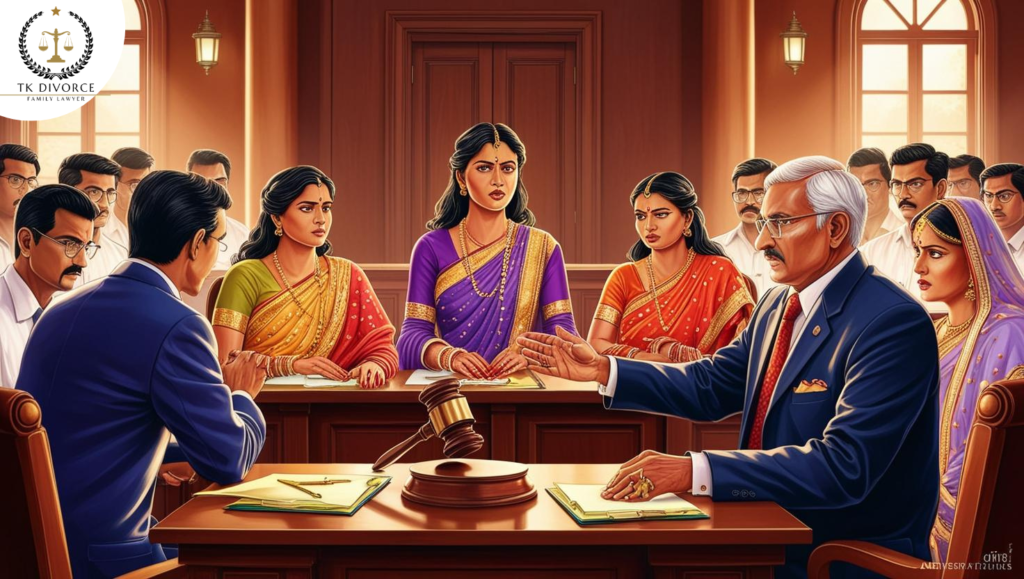Contested Divorce in Patna: What It Is, Process, and Legal Guidance

What is Contested Divorce?
A contested divorce arises when spouses cannot mutually agree on matters such as:
- Division of assets and property
- Child custody and visitation rights
- Alimony or spousal support
- Grounds for divorce
In such cases, the intervention of the family court in Patna is necessary to resolve these disputes. The court evaluates evidence, hears testimonies, and delivers a judgment based on legal statutes and the best interests of the involved parties, especially children.
Contested divorce in Patna occurs when both spouses cannot agree on key issues like alimony, child custody, or property division, requiring legal intervention. These cases are handled under the Hindu Marriage Act, 1955 or other relevant laws, depending on the religion of the parties. A skilled lawyer specializing in Contested Divorce in Patna can guide you through the complex legal process, ensuring your rights are protected. If you’re facing a contested divorce, seek expert legal advice to resolve disputes effectively and achieve a fair outcome.
Contested Divorce in Patna: Expert Legal Guidance for Complex Cases
When a marriage faces irreconcilable differences, couples may opt for a contested divorce if mutual agreement cannot be reached on crucial matters. Contested Divorce in Patna refers to cases where one or both parties dispute issues such as alimony, child custody, property division, or grounds for divorce. These cases often require court intervention to resolve conflicts and ensure a fair settlement for both parties.
Steps in a Contested Divorce Case in Patna
- Filing the Petition: One spouse files a divorce petition in the appropriate family court in Patna.
- Summons and Response: The court issues a summons to the other spouse, who must respond within the stipulated time.
- Preliminary Hearing: The court conducts an initial hearing to understand the issues and decide the course of action.
- Evidence and Testimonies: Both parties present evidence, documents, and witness testimonies to support their claims.
- Mediation (if applicable): The court may recommend mediation to resolve disputes amicably.
- Final Hearing and Judgment: After evaluating all evidence and arguments, the court delivers its judgment.
Challenges in Contested Divorce in Patna
- Lengthy Process: Contested divorces can take years to resolve due to legal complexities and court schedules.
- Emotional Stress: The prolonged process can be emotionally taxing for both spouses and their families.
- Financial Burden: Legal fees, court expenses, and other costs can add up significantly.
- Impact on Children: Custody battles and prolonged disputes can affect children’s mental well-being.
Constitutional Perspective
Article 14 (Right to Equality)
- Ensures equal treatment of spouses before the law, irrespective of gender.
Article 15 (Prohibition of Discrimination)
- Prohibits gender-based discrimination in marital rights and remedies.
Article 21 (Right to Life and Personal Liberty)
- Protects individuals from marital conditions that violate dignity or personal liberty, forming the basis for laws against cruelty and harassment.
Legal Framework for Contested Divorce in India
Key Legislations Governing Contested Divorce
Specific to Muslim women, recognizing grounds like non-maintenance, cruelty, or husband’s impotence.
- Hindu Marriage Act, 1955 (HMA)
- Applicable to Hindus, Buddhists, Jains, and Sikhs.
- Relevant Sections:
- Section 13(1): Grounds for divorce, such as cruelty, adultery, desertion, and mental disorder.
- Section 13(1A): Grounds based on non-resumption of cohabitation or non-compliance with a restitution of conjugal rights decree.
- Indian Divorce Act, 1869
- Applicable to Christians.
- Grounds: Adultery, cruelty, desertion, or conversion to another religion.
- Muslim Personal Law (Shariat Act, 1937)
- Grounds include cruelty, desertion, non-maintenance, or imprisonment under the concepts of Faskh (judicial divorce) and Talaq-e-Tafweez.
- Parsi Marriage and Divorce Act, 1936
- Grounds: Infidelity, cruelty, willful neglect, or imprisonment.
- Special Marriage Act, 1954
- Applicable to interfaith or civil marriages.
- Grounds: Cruelty, adultery, desertion, unsound mind, or incurable disease.
- Dissolution of Muslim Marriage Act, 1939
- Specific to Muslim women, recognizing grounds like non-maintenance, cruelty, or husband’s impotence.
Constitutional Perspective
Right to Equality (Article 14)
- Ensures equal treatment of spouses before the law, irrespective of gender.
Article 15 (Prohibition of Discrimination)
- Prohibits gender-based discrimination in marital rights and remedies.
Right to Life and Personal Liberty (Article 21)
- Protects individuals from marital conditions that violate dignity or personal liberty, forming the basis for laws against cruelty and harassment.
Grounds for Contested Divorce Under Indian Laws
- Adultery
- Defined as voluntary sexual intercourse with someone other than the spouse.
- Landmark Case: Joseph Shine v. Union of India (2018)
- Decriminalized adultery under IPC Section 497 but retained it as a civil ground for divorce.
- Cruelty
- Includes physical, mental, or emotional abuse.
- Landmark Case: V. Bhagat v. D. Bhagat (1994)
- Defined mental cruelty as behavior causing suffering that makes cohabitation unreasonable.
- Desertion
- Willful abandonment of the spouse without reasonable cause for at least two years.
- Landmark Case: Bipinchandra Shah v. Prabhavati (1957)
- Defined desertion as both physical separation and an intention to abandon.
- Mental Disorder
- Includes severe mental illness making cohabitation unsafe or unreasonable.
- Landmark Case: Alka Sharma v. Abhinesh Chandra Sharma (1991)
- Highlighted that the disorder must be of such severity that it prevents a normal marital relationship.
- Conversion
- When one spouse converts to another religion and abandons the marriage.
- Incurable Disease
- Includes diseases like leprosy or sexually transmitted infections.
- Non-Compliance with Restitution of Conjugal Rights
- Failure to resume marital relations despite a court decree.
Judicial Activism: The Indian judiciary has played an active role in interpreting mutual divorce laws, ensuring that no law or provision violates fundamental constitutional principles such as equality, non-discrimination, and the right to live with dignity.
Protection of Women’s Rights: While mutual divorce ensures equality, there is a growing concern about the protection of women’s rights in such proceedings. To address this, courts often ensure that there is no undue pressure on the woman to consent to the divorce, particularly in cases where economic dependency or social norms might influence the decision.
Mutual divorce in India reflects the Constitution’s commitment to upholding the dignity and equality of individuals, while also ensuring the protection of personal rights. While mutual divorce provides an efficient and less contentious solution to marital dissolution, judicial safeguards ensure that neither party is coerced and that the process respects the constitutional values of justice, equality, and freedom. The interpretation of mutual divorce laws must always balance individual autonomy with the protection of rights, ensuring fairness and non-discrimination in the process.
Judicial Interpretation and Landmark Judgments
Cruelty as a Ground for Divorce
- Narendra v. K. Meena (2016): Persistent accusations and attempts to separate the spouse from their family constituted mental cruelty.
- Shobha Rani v. Madhukar Reddy (1988): Dowry harassment was recognized as a form of cruelty.
Adultery and Divorce
- Savitri Pandey v. Prem Chandra Pandey (2002): Adultery must be proven with substantial evidence to be a valid ground for divorce.
Desertion and Intention
- Lachman Utamchand Kirpalani v. Meena (1964): Clarified that desertion involves both factual separation and an intention to desert.
Restitution of Conjugal Rights
- Sareetha v. Venkata Subbaiah (1983): Questioned the constitutionality of restitution of conjugal rights, linking it to personal liberty.
Irretrievable Breakdown of Marriage
- Naveen Kohli v. Neelu Kohli (2006): Advocated for the inclusion of irretrievable breakdown as a ground for divorce, though not codified.
Procedure for Contested Divorce in Patna
- Filing a Petition
- Filed by one spouse in the appropriate family court.
- Respondent’s Reply
- The other spouse responds to the petition, either contesting or presenting a counterclaim.
- Evidence and Witness Examination
- Parties present evidence and witnesses to support their claims.
- Judgment
- Based on evidence, the court either grants or dismisses the divorce petition.
- Appeals
- Either party can appeal the decision in a higher court if dissatisfied.
Challenges in Contested Divorce
- Lengthy and expensive litigation.
- Emotional toll on parties and children.
- Burden of proof lies heavily on the petitioner.
Why Choose TK Divorce & Family Lawyers for Mutual Divorce?
At TK Divorce & Family Lawyers, we know that opting for a Contested Divorce in Patna is a significant decision. Our goal is to make the process straightforward, stress-free, and amicable. Here’s why we’re the preferred choice for mutual divorce cases:
How We Can Help
Our team of experienced lawyers specializes in handling Contested Divorce in Patna, offering personalized guidance and strong representation in court. We prioritize your rights and work diligently to ensure a fair and just outcome for your case.
Services Provide By Us
Alimony and Maintenance in Patna
Contact best divorce lawyer Patna
Court Marriage in Patna
Divorce Advocate in Patna
Divorce Under Muslim Personal Law
Dowry and Domestic Violence
Inter Religion Marriage in Patna
Inter-Caste Court Marriage In Patna
Connect With Our Social media
Our Legal Networks
Best Tax Law Firms in Bihar
List of all Honoble High Courts
Search Your Case
About Us
